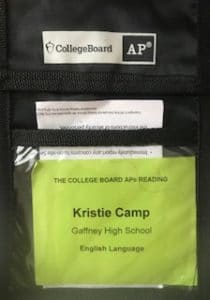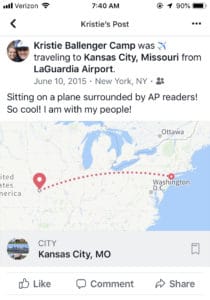Finding My People | Fiveable
6 min read•july 11, 2024
Kristie Camp
Kristie Camp
I stepped off the plane yesterday fatigued and energized at the same time.
I had just spent about eight days in what we sometimes refer to as “English Teacher Summer Camp” at the AP reading in Tampa, Florida, where we scored essays from the AP English Language and Composition exam. About 1600 of my colleagues and I scored over 1.5 million essays, and I was exhausted by the time I hit the Charlotte airport and rushed to hug my husband and son who were there to take me home.

And yet, I had already begun planning for next year, excited about all I had learned and anxious to put some plans into action.
This combination of working tirelessly alongside my compatriots from 8 am to 5 pm every day and sharing stories with them socially at meals and in the evenings is what keeps me coming back each year.
I have been an AP reader for five years now, and as intense and tiring as the work is, the benefits of spending time with teachers from all across the nation and from other countries (both AP English Language and Composition teachers as well as college English professors) can’t necessarily be measured, but I hope to articulate why gatherings like these are special and valuable - why teachers need an opportunity to connect professionally and socially with other educators outside their particular school system.
My People
On the plane ride into Kansas City on my first AP reading experience five years ago, I posted on Facebook that I had found My People, and every year, that feeling resurfaces the minute I start talking to another reader.
Since we all teach basic composition courses, whether in high school or at the college level, we all share common goals and experiences, and that creates a camaraderie that is a little different from the team cohesion I have with other English teachers in my building or even my district.

In my building, my colleagues and I share a tight bond built through factors that transcend the academic world; we build friendships and teams through morning cafeteria duty and pep rallies and standardized test administration training. We often see each other more than we even see members of our family, so we grow to form into something of a family ourselves, and those bonds can grow thick and knotty like roots that persist enough to wrap around barriers that pop up like sidewalks or tombstones.
Yet, when teachers have the opportunity to step outside their immediate world and connect with teachers like them, to find and connect with Their People, especially when they are able to work with teachers who teach the same courses but are from countless other geographic areas, something magical happens.
Part of the magic of AP reading comes from the shared responsibility of scoring all those essays.
The number of essays in front of us looms dark and heavy as a storm cloud, but then there is another factor that makes the storm even more menacing. We can never forget that behind every one of these exam booklets is a student who most likely wrote until his or her hand was nearly numb throughout the school year to prepare to write the essays sitting before us. Especially for all of us who teach AP Language and Composition, we know the teenagers who wrote these essays even if we didn’t teach them because they are not so different from our own students regardless of where they may live.
Not much differently than storm chasers in the physical world, we storm chasers of the academic world know that we must endure the storm as a team: unified, each taking on his or her individual role, all in sync for the common goal.
Getting Calibrated
As we read sample essays and establish the criteria for the scores, we often take time to calibrate ourselves, which means that we read sample essays at each score point and discuss among colleagues at our table what characteristics of the answer align with the requirements for the score points. Yet, the AP reading itself is a way to calibrate our academic and pedagogical selves.
Sometimes, working in our classrooms behind locked doors, working in pods or in teams separated from the rest of the faculty, burying ourselves in the needs of our particular students in our particular town, we lose sight of the bigger goal – the meaning and purpose behind teaching as a profession. We allow the challenges that seem unique to our demographic to act like weights on our ankles or like the blinders that horses wear to keep them looking in one direction.
When I connect with My People at the AP reading, I learn that my struggles at my school are not much different from the struggles of composition teachers anywhere else in the US or around the world. When I read over 1000 essays all answering the same prompt, I learn that 17-year-old kids are 17-year-old kids wherever they may live.
And that is refreshing. And liberating.
This recalibrating moment helps me to focus on what is important – teaching my students to write and to express themselves clearly, not an AP exam grade or even an SAT or ACT score. If 17-year-olds in Chicago or Salt Lake City or some town I have never heard of in Kansas seem to face the same challenges my 17-year-olds face, and if composition teachers worldwide face the same challenges I face, then we can quit worrying about the numbers and return our attention to the people themselves – our students and our colleagues.
I walk away from the AP reading experience knowing that I am not alone, and I feel empowered by the team spirit I encountered working with those who are engaged in the same battle against illiteracy and ignorance I am battling.
Spread the Word
I know that I am quite blessed to be a member of the AP community and especially blessed to serve as an AP reader because I get this amazing opportunity to engage with My People every summer - to work on a common task until I am melting with fatigue, but also becoming refreshed by all that I have learned and experienced.
I am also quite aware that thousands of teachers who grind out excellent lessons every day are never offered the chance to work with Their People.
This needs to change.
All teachers need the chance to step outside of their locked classrooms, their pods and teams, their districts and towns so that they can connect with Their People. Of course, I know that not all of us are AP teachers, but I can’t allow that any of us are teaching a totally unique group of students in a totally unique setting. Serving as an AP reader has taught me that. There are others like us out there, and we have to find them to keep ourselves calibrated.
Administrators, school board members, and legislators, you can help. Please allocate funds for professional development outside the school setting. Please encourage and help your teachers find Their People through professional organizations and teacher cohorts. Then, provide a space for your teachers to share what they have learned with their colleagues. I promise that you will benefit from the renewed energy and refreshing breeze of possibilities.
Teachers, we have options, too. I know money is always a limitation for teachers, but we have connections available through social media.
Finding Your Peopleonline will give you a place to exchange ideas and stories and just to encourage each other.
Also, we can try to engage with our colleagues outside of the school setting; sharing social time together allows us to share our stories, and most of the time, sharing stories with each other brings us closer, helps us recognize and celebrate our shared humanity.
If we get the chance to interact with Our People, stay connected. Together, we find our strength to complete our individual tasks.